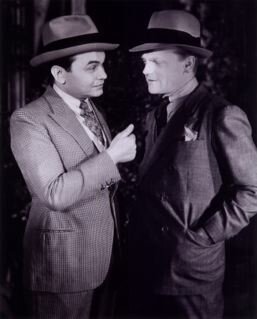You are hereThe Soter Family / Gangsters
Gangsters
COULD I PLEASE BLOT YOUR ESCUTCHEON?
A memoir, by GEORGE SOTER
 Hollywood gangsters Edward G. Robinson (left) and James Cagney.
Hollywood gangsters Edward G. Robinson (left) and James Cagney.
When I stop to consider what I was like as a child I shudder to think of what my children are going to be if the old adage, "Like father, like son," holds true. Not that I was venomous or ferocious – just a little too energetic. When I was about seven years old my family and I had quite a difficult time contending with "tryouts" of the professions that I might some day honor with my name. My professional choices bad been narrowed down to the point where I had but two left – both appealing, both equally preposterous. These two choices were: (a) being a gangster or (b) being a doctor.
The incident which changed my mind about being a gangster occurred soon after my parents had set me loose on the world to wreak havoc in the external regions. I bad exhausted all the havoc-wreaking possibilities of our little four-room apartment. With my usual finesse and savoir faire I immediately selected as my bosom friend and confident the most disreputable, ferocious, and moronic little individual in the neighborhood. We were still living in the era of gangdom glory and gory, and my little Mephistophelean companion had somehow got the notion into his horned head that destiny had written his name as the one which was to succeed Capone's. So off we set: he, the leader, and I, the mob (also alternating for the moll, which we pronounced mole and without which we considered any gang a dismal failure).
Our first job was to be making the janitor of the apartment building in which we lived pay us protection money a la the example set by George Raft and Edward G. Robinson. If he refused to pay, we would threaten to throw a bomb at his building or at least break a window. The first hitch in the proceedings came when we tried to decide how we would explain to the janitor that we wanted protection money; however, I hit upon the happy idea of breaking a window first and asking for payment later. My partner, Butch (or maybe we had decided to call him Slug, and I was Butch), amended the idea so that the final plan was to be carried out thus: Butch would wait around the corner, on the lookout for "cops." If any came, the signal would be "Cheese it, the cops!" In the meantime I would saunter rapidly around the building, loaded down with enough rock to build a house, and quietly proceed to break every other window in the basement of the building. After the third window, I somehow lost all taste for the undertaking, and more so when I noticed that my boss and, incidentally, look-out had "double-crossed" me and disappeared. The distaste turned to absolute revulsion when I felt the long arm of the law or, at most, the short arm of the janitor clasping my pink neck.
Young George.
My mother, an exceedingly patient woman, after doling out the necessary money to cover the damages, took me to one side and tried to show me the error of my ways, the inadvisability of my following the path of degradation that would bring shame and a heavy blot on our family's escutcheon. My mother, however, was not entirely the ten-volumes-on-child-psychology type; therefore, she warned me, "You'll go unpunished this time, but if this ever occurs again...," and the tone of her voice and the glint in her eyes told me strongly enough the hell that would await me were I to forget her admonition.
But her warnings were the warnings of a Cassandra, and sadly enough, it happened again, only this time with much more vehemence. Upon finding me "sprung from the pen," Butch convinced me that we had to carry out our plans to their completion, only now we would have to break a few windows in the upper stories as retribution for my public disgrace. The idea appealed to my young and innocent mind to such a degree that I completely forgot to question Butch on the particulars of his invisibility act, or why he said “we” when it was invariably was "I." Onward I went, carried forward by my lofty ambition and retarded somewhat by my weighty rocks. This time, I was no longer the inexperienced novice; I lost not the taste for my work until it was masterfully completed; and I felt somewhat like a Saracen-captured crusader when the janitor led me for a second time before my poor, astonished mother whose astonishment soon turned into a terrific anger. Hell hath no fury like a woman scorned, and I was in a position to offer valid testimony. That night I slept on an empty stomach with a tear-stained face; and I reached the conclusion that being a gangster was definitely inadvisable for anyone, unless he did not have a mother.
1949
